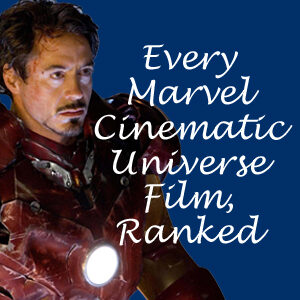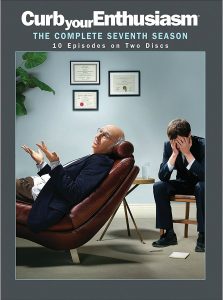I intended to round out my top 20 “Curb Your Enthusiasm” issues with seven “big issues.” But really, are these issues bigger than the 13 bits of minutiae explored in my previous post? When you boil it down, no. I’m reminded of “Don’t Sweat the Small Stuff — and it’s all small stuff,” a wonderfully titled book by Richard Carlson that I haven’t read. Even the big things on “Curb” can be whittled down to small things, and they can therefore be laughed at.
Still, while religion might not play a bigger role in Larry’s life than the choice of whether to sit down or stand up when going to the bathroom, it is one of seven easy-to-label themes that “Curb” keeps coming back to. Here they are:
RELIGION
Larry catches the tail end of a baptism and rushes into the water to save the woman he thinks is drowning. He uses a Christ nail to do some interior decorating. He tries to get a Christian Scientist to take medication by baking it into brownies. He’s caught on a ski lift with a woman who can’t be in the presence of a man after sundown. He thinks a particular sect of Jews have sexual intercourse through a hole in a sheet.
Part of why I love “Curb” is the way Larry David cleverly makes fun of religion. I also like comedian Bill Maher because of his well-written stand-up comedy (and the movie “Religulous”) tackling the silliness of spiritual beliefs and rituals. The same goes for the late George Carlin’s diatribes against corporate religion.
Somehow it seems like David’s poking fun at religion has raised less of a fuss than other comedians’. I think this might be because David is, at least by the wider definition, religious: He observes many Jewish customs throughout the series, even as he exposes their sillier sides.
Philosophically, David is arguably an atheist like Maher and Carlin, but because he comes from an “insider” perspective as a Jew, he is able to win over both religious (at least those with a sense of humor) and non-religious TV viewers.
I feel like we are near the end of the rope with political correctness — a lot of it has stuck (“post-traumatic stress syndrome” instead of “shell shock,” as Carlin pointed out), but reasonable people are starting to stand up to particularly absurd conventions. One of those is that non-religious people can’t make fun of religion. “Curb” is helping to change this unfair, unwritten rule.
LANGUAGE
On close inspection, George Carlin’s “Seven Words You Can’t Say on Television” is an incomplete list. Obviously, racial slurs can’t be said on TV, either, but Carlin didn’t want to go there.
Leave it to Larry David to realize that the N-word had in recent years become such a bad word that you can’t even say it when telling that you heard someone else say it. Doing that gets Larry in trouble in the classic sixth-season episode “The N Word.”

First, he hears someone using it on the phone in the bathroom and he tells a nurse; a doctor overhears him and flies into an unfocused rage that ends with him mistakenly shaving Jeff’s head. Later, the African-American family staying with the Davids overhears him, and they move out. Finally, he’s asked to tell the story at a court deposition and — understandably, at this point — he refuses.
Of course, all of this could’ve been avoided if Larry had simply said “the N-word,” as I am doing in this blog post. But the point remains, and it recalls Carlin’s: Words themselves aren’t bad; it’s the way they are used that matters.
While language can be used to distance yourself or make yourself feel superior to a group, it can also be used to foster belonging. In Season 3’s “Krazee-Eyez Killa,” Larry talks crassly around the rapper whom Wanda is dating in order to be friends with him. And two episodes later in “The Grand Opening,” when a chef with Tourettes syndrome starts swearing randomly, everyone in the restaurant starts throwing out random curse words to diffuse the awkwardness. These are two examples of people using bad words to make things easier, rather than harder.
And sometimes Larry gets in trouble simply for pointing out that a word isn’t being used properly, like in Season 5’s “Kamikaze Bingo,” when he points out that a Japanese pilot who survived the war wasn’t technically a kamikaze pilot. That’s very Carlin-esque.
SUPERFICIALITY
In Season 4’s “The Blind Date,” Michael — the blind pianist working “The Producers” rehearsals with Larry — dates an alleged supermodel who is actually not particularly good-looking. Larry points this out to him and he dumps her. Michael also dates a Muslim woman briefly, before her headscarf comes off and Larry sees that she’s not attractive either.
Of course, Michael can’t see what these women look like, so presumably he would be more open than a sighted person to getting to know them and forging a connection that way. But, as “Curb” correctly points out, being blind doesn’t necessarily make you a better person.
For one thing, Michael can use his sense of touch to find out what a woman looks like. Furthermore, these episodes show that superficiality isn’t entirely about wanting to be with a beautiful woman. It’s more about wanting society to know you are with a beautiful woman. That’s a key distinction that says a lot about the modern dating game, at least as many people play it.
SELFISHNESS
Season 5 — the one where Richard Lewis needs a kidney — takes our favorite characters’ selfishness to logical extremes. Larry and Jeff are tested to see if their kidneys are compatible with Lewis; both hope they are not. Larry sits by the bedside of Richard’s comatose cousin, on some level hoping Louis Lewis will die so Richard can get his kidney. When he wakes up, Louis refuses to give up a kidney. And ultimately, when Larry does donate a kidney and seemingly dies on the operating table, the scenes are intercut with shots of a healthy Richard Lewis lounging on the beach with supermodels.
These episodes, although funny, are also somewhat hard to watch because deep down we are all hoping we never get asked to give up a kidney, or bone marrow or whatever. Because we know we’d probably act much like Larry and Jeff (although most of us probably would not act like Richard Lewis if we were on the receiving end).
This is a case of “Curb” holding up a mirror and saying: “We’re not as good as we say we are. Deal with it.” That honesty is scary, but also — when placed against the backdrop of other modern TV shows — refreshing.
STEREOTYPES
I can’t think of anyone on “Curb” who I’d describe as a “surprising” character. The comedians and entertainment-industry types are generally not terrible guys (Larry, Jeff, Ted Danson, Richard Lewis), but Larry David doesn’t shy from portraying their less-savory, selfish traits.
Wanda Sykes plays herself as a parody of herself (the shrill black woman). (And Susie is the shrill Jewish woman who berates her husband.) Krazee-Eyez Killa is obviously an extreme version of a West-coast rapper, and Leon is a classic “street smart, not book smart” black youth. They are all black stereotypes, and yet they aren’t boring or ridiculous characters.
In Season 5’s “The Korean Bookie,” Larry suspects that his Korean bookie has killed Jeff’s dog, Oscar, and served him up at a wedding. “You know, some of them eat dog,” Larry whispers to Jeff. And that widely believed stereotype provides the foundation for Larry unleashing a mass panic at a wedding.
Now granted, I could find favorable portrayals of all races and classes on “Curb.” And certainly, the aforementioned comedians, African-Americans and Korean aren’t necessarily “unfavorable” portrayals. And Larry does say SOME Koreans eat dog, showing that he is sensitive to stereotyping even as he engages in it.
The bottom line here is that David embraces cultural and class stereotypes because that’s what’s real. We should never assume that someone fits a stereotype, but when they do, we can acknowledge it — and laugh.
INTIMIDATION VS. INTELLECTUALISM
When logical arguments fall on deaf ears, Larry resorts to the stare-down. He locks eyes with his opponent, slowly takes him in from different angles, and usually ends up by nodding and saying “OK.” As in, “You pass.”
I think the stare-downs are a one-on-one sitcom equivalent of our 2010 political climate. Even with our economy in bad shape, this still isn’t shaping up to be a thoughtful, logical-argument-driven election. As always, it’s about delivering a vague message with charisma, being a good speaker and being well dressed. That’s what resonates with voters, and that will be proven again when we see who gets elected next month.
“Curb’s” stare-downs are a way to cut through the talk and determine a winner. It’s swift, it solves nothing, but it does provide a conclusion to a plot thread. And it makes me laugh just about every time.
HAPPINESS
In promo materials, Larry is often shown slumped over, or in an awkward situation, or on a therapist’s couch. “This poor schlub has issues” is the shorthand message. And yet, as I watch the series, I see a contented person who is fulfilled by his career (“Seinfeld” and enough subsequent projects like “The Producers,” which he ultimately nails) and personal life (a beautiful, mostly forgiving wife; good friends; a nice house with nice things in it).
So when Larry is asked how he’s doing and he says “Pretty … pretty … pretty … pretty good,” I believe him. The recurring device is funny (in a stupid way, natch), and it’s also an important acknowledgement to the audience: I have it pretty good, Larry David seems to be saying, and as much as I complain about the little things, I’m not complaining about the big things.
What do you love about “Curb Your Enthusiasm?” Share your thoughts in the comment thread below.

